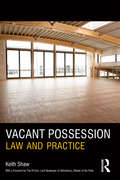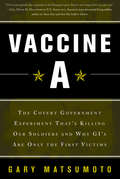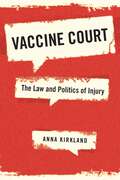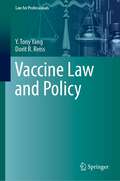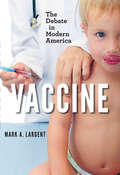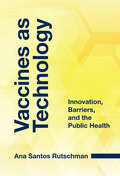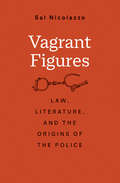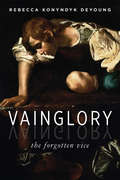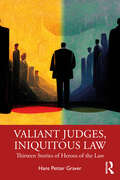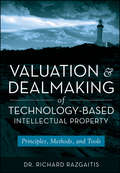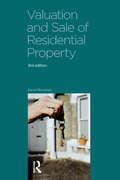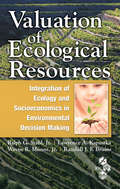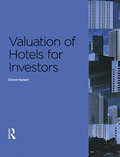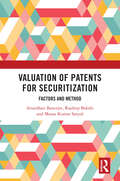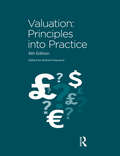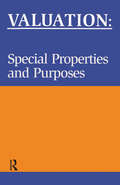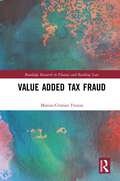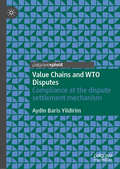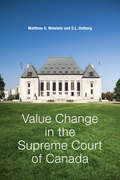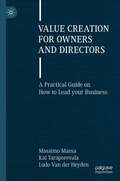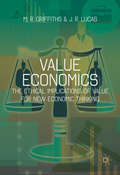- Table View
- List View
VOB/B nach Ansprüchen: Entscheidungshilfen für Auftraggeber, Planer und Bauunternehmen (Bau- und Architektenrecht nach Ansprüchen)
by Christian ZannerDas Fachbuch vermittelt in allgemein verständlicher Form alle wichtigen Kenntnisse zur VOB/B und dem Baurecht im BGB. Es gibt Sicherheit bei der Durchsetzung und Abwehr von Ansprüchen aller am Bau Beteiligten während der Bauabwicklungsphase und der sich anschließenden Mängelhaftung. Das Fachbuch ist das ideale Hilfsmittel auf jeder Baustelle. Durch den Aufbau des Werkes nach Ansprüchen kann es in der Praxis als Nachschlagewerk für einzelne Situationen herangezogen werden. Die 7. Auflage berücksichtigt die aktuelle Rechtsprechung und die neuen Regelungen zum Baurecht im BGB, die am 01.01.2018 in Kraft getreten sind.
Vacant Possession: Law And Practice
by Keith ShawVacant possession is an element of property law that ensures a property is left in good condition when it changes hands. Every time a property is sold, or if tenants move out of rented property, vacant possession is unavoidable; a vital part of the job of any property lawyer or surveyor. Yet this is the first book to look at this area in depth. If a property professional understands vacant possession they can make sure their cases move quickly and complete at a time that suits them. If they do not, they are vulnerable to others who know it better and can use the law to frustrate proceedings for months or even years while their clients continue to pay money on rent or mortgage payments for properties they're not using. This book is essential reading for all property lawyers and surveyors. It is destined to be the definitive guide to vacant possession.
Vaccine A: The Covert Government Experiment That's Killing Our Soldiers -- and Why GI's Are Only the First Victims
by Gary MatsumotoIn this provocative look at the US military from the Persian Gulf War through the 2003 invasion of Iraq, investigative journalist Gary Matsumoto contends that an anthrax vaccine dispensed by the Department of Defense was the cause of Gulf War Syndrome and the origins of a massive cover-up. Matsumoto calls it the worst friendly-fire incident in military history. A skillfully-woven narrative that serves as a warning about this man-made epidemic, Vaccine A is a much needed account of just what went wrong, and why.
Vaccine Court: The Law and Politics of Injury
by Anna KirklandA behind-the-scenes examination of the special court dedicated to claims that vaccines have caused harmThe so-called vaccine court is a small special court in the United States Court of Federal Claims that handles controversial claims that a vaccine has harmed someone. While vaccines in general are extremely safe and effective, some people still suffer severe vaccine reactions and bring their claims to vaccine court. In this court, lawyers, activists, judges, doctors, and scientists come together, sometimes arguing bitterly, trying to figure out whether a vaccine really caused a person’s medical problem. In Vaccine Court, Anna Kirkland draws on the trials of the vaccine court to explore how legal institutions resolve complex scientific questions. What are vaccine injuries, and how do we come to recognize them? What does it mean to transform these questions into a legal problem and funnel them through a special national vaccine court, as we do in the US? What does justice require for vaccine injury claims, and how can we deliver it? These are highly contested questions, and the terms in which they have been debated over the last forty years are highly revealing of deeper fissures in our society over motherhood, community, health, harm, and trust in authority. While many scholars argue that it’s foolish to let judges and lawyers decide medical claims about vaccines, Kirkland argues that our political and legal response to vaccine injury claims shows how well legal institutions can handle specialized scientific matters. Vaccine Court is an accessible and thorough account of what the vaccine court is, why we have it, and what it does.
Vaccine Law and Policy (Law for Professionals)
by Y. Tony Yang Dorit R. ReissVaccine Law and Policy is the first book on vaccine law and policy written specifically for the general public or an educated lay audience without legal background. It offers comprehensive but accessible coverage of key aspects of vaccine law and policy, from product development and intellectual property protections, to regulation, public mandates, and vaccine injury claims. The COVID-19 pandemic sparked a growing interest in learning more about vaccine law and policy, as vaccine development, access, safety and requirements became relevant to hundreds of millions of people worldwide. This book covers United States law in most detail, but the developments and trends described have parallels in many countries, and the United States model and its actions influence others. Some of the most widely used vaccines against COVID-19 - mRNA vaccines – were developed in the United States, and choices made in the United States impact other countries.United States law currently has so much to say about vaccines. From the federal mandate President Biden enacted requiring federal employees to be vaccinated against COVID-19, to the growing number of private employers requiring vaccines to return to work, vaccine law has become a prevalent topic in everyday life. But there is little writing about the legal aspects of vaccines directed at the general public or an educated lay audience without a legal background. Vaccine Law and Policy will not only be invaluable to professionals implementing vaccine law and policy, but also to regulators, public health officials, and scientific researchers.Vaccine Law and Policy covers the wide range of laws and policies that impact the field. These include, among others, regulatory oversight by the FDA, one of the most influential bodies in drug and vaccines regulation worldwide, enforcement, and regulation of the research and development of vaccines; vaccine mandates for children and in the workplace, and medical, religious, and philosophical exemptions to them; patent law and other intellectual property protections such as trademark, trade secret, unfair competition, and copyright law; compensation for vaccine injuries under the National Vaccine Injury Compensation Program (NVICP) and other avenues of liability; safety monitoring; access to vaccines, their promotion, and issues related to funding and costs. The book will also discuss issues related to anti-vaccine movements and vaccine advocacy.
Vaccine: The Debate in Modern America
by Mark A. LargentA thoughtful evaluation of the vaccine debate, its history, and its consequences.Since 1990, the number of mandated vaccines has increased dramatically. Today, a fully vaccinated child will have received nearly three dozen vaccinations between birth and age six. Along with the increase in number has come a growing wave of concern among parents about the unintended side effects of vaccines. In Vaccine, Mark A. Largent explains the history of the debate and identifies issues that parents, pediatricians, politicians, and public health officials must address.Nearly 40% of American parents report that they delay or refuse a recommended vaccine for their children. Despite assurances from every mainstream scientific and medical institution, parents continue to be haunted by the question of whether vaccines cause autism. In response, health officials herald vaccines as both safe and vital to the public's health and put programs and regulations in place to encourage parents to follow the recommended vaccine schedule.For Largent, the vaccine-autism debate obscures a constellation of concerns held by many parents, including anxiety about the number of vaccines required (including some for diseases that children are unlikely ever to encounter), unhappiness about the rigorous schedule of vaccines during well-baby visits, and fear of potential side effects, some of them serious and even life-threatening. This book disentangles competing claims, opens the controversy for critical reflection, and provides recommendations for moving forward.
Vaccines as Technology: Innovation, Barriers, and the Public Health
by Ana Santos RutschmanThe COVID-19 pandemic served as a powerful wake-up call, highlighting our collective need for the effective development and equitable distribution of new vaccines, in addition to widespread administration of existing ones. The current models of production and allocation of vaccines against emerging pathogens, which rely on predominantly market-driven mechanisms, are largely at odds with public health needs. This book is the first to explore the entire arc of vaccine development and distribution, from the decisions about allocation of vaccine R&D money to allocation and administration of vaccines resulting from the R&D process. It explains key concepts and problems in vaccine regulation, intellectual property, technology transfer, and international relations, making complex material accessible to a non-specialist audience. Analyzing the impact of COVID-19, the book also covers several other vaccine races, as well as future directions in vaccine development and allocation.
Vagrant Figures: Law, Literature, and the Origins of the Police (The Lewis Walpole Series in Eighteenth-Century Culture and History)
by Sal NicolazzoHow vagrancy, as legal and imaginative category, shaped the role of policing in colonialism, racial formation, and resource distribution In this innovative book demonstrating the important role of eighteenth-century literary treatments of policing and vagrancy, Nicolazzo offers a prehistory of police legitimacy in a period that predates the establishment of the modern police force. She argues that narrative, textual, and rhetorical practices shaped not only police and legal activity of the period, but also public conceptions of police power. Her extensive research delves into law and literature on both sides of the Atlantic, tracking the centrality of vagrancy in establishing police power as a form of sovereignty crucial to settler colonialism, slavery, and racial capitalism. The first book in several generations to address policing and vagrancy in the eighteenth century, and the first in the field to center race and empire in its account of literary vagrancy, Nicolazzo&’s work is a significant contribution to the field of eighteenth-century literary and cultural studies.
Vainglory: The Forgotten Vice
by Rebecca Konyndyk DeYoungJulia Roberts on the red carpet at the Oscars. Lady Gaga singing “Applause” to worshipful fans at one of her sold-out concerts. And you and me in our Sunday best in the front row at church. What do we have in common?Chances are, says Rebecca Konyndyk DeYoung, that we all suffer from vainglory -- a keen desire for attention and approval. Although contemporary culture has largely forgotten about vainglory, it was on the original list of seven capital vices and is perhaps more dangerous than ever today.In Vainglory: The Forgotten Vice DeYoung tells the story of this vice, moving from its ancient origins to its modern expressions. She defines vainglory, gives examples from popular culture, explores motivational sources, and discusses other vices associated with it such as hypocrisy and boasting. After exposing the many ways in which vainglory can rear its ugly head, she explores personal spiritual practices that can help us resist it and community practices that can help us handle glory well.
Valiant Judges, Iniquitous Law: Thirteen Stories of Heroes of the Law
by Hans Petter GraverThis book is about heroes of law. It provides examples of when judges have exercised courage, moderation, wisdom, and justice rather than blindly following the law. It also discusses the contentious issue of whether a judge has a moral responsibility to defend the rule of law, regardless of what the law actually states. The work presents a collection of thirteen stories about judges who in different settings have stood up against the authorities and public opinion in the defence of the rule of law. An introductory chapter sets the scene with two examples of situations gone wrong when those applying the law have just followed the demands of those in power. The thirteen stories are followed by two theoretical chapters discussing the moral responsibility of the judge. Finally, the book explores the kind of ethical theory required to guide judges in the assessments they must make, and the choices they have to take in order to fulfil their moral responsibilities. It is argued that the classic virtues of courage, moderation, wisdom, and justice are all qualities that can contribute to both sound judgment and reflection. The book thus seeks to nurture a realistic culture and a tradition of cultivating lawyers who defend the rule of law. Against a background where the history of our legal institutions when put to the test, is largely nothing to be proud of, the work seeks to change this by highlighting and reflecting on the exceptions. The book will be illuminating reading for students and academics working in the areas of Jurisprudence, Legal Ethics, and Legal History.
Valor: The American Odyssey of Roy Dominguez
by Rogelio "Roy" DominguezThe son of Hispanic immigrants, Rogelio "Roy" Dominguez grew up in gang-plagued Gary, Indiana. With strong family support, he managed to beat the odds, graduating with distinction from Indiana University, finishing law school after a rough start, and maturing into a successful attorney and officeholder. Yet there was more in store for Roy. Ready to start a family and embark on a career as a deputy prosecutor, he was stricken with Guillain-Barré syndrome. How he coped with and eventually overcame this debilitating affliction is a compelling part of his story. The experience steeled him to meet future crises with wisdom, perspective, and grit. An inspiring true story, Valor is also a significant and original contribution to the social, ethnic, and political history of Indiana.
Valuation and Dealmaking of Technology-Based Intellectual Property
by Richard RazgaitisThis indispensable tool provides readers with complete coverage of the issues, methods, and art of valuing and pricing of early-stage technologies including backgrounds in the core concepts, sources of value, methods of valuation, equity realizations, and negotiation strategies.
Valuation and Sale of Residential Property
by David MackminValuation and Sale of Residential Property is aimed at all those studying for a qualification or already practising as residential valuers, surveyors and estate agents. It provides valuable information on all elements of the home sales process, enabling professionals to give advice on market value, the best means for sale, condition and financial arrangements. Topics covered include: determinants of value and provision of the valuation agency, auction and taking instructions mortgage valuation and survey legal process and types of tenure investment and return. The author considers these topics against a background of wide legislative change and draws on the standard guidelines set down by the RICS and NAEA. This third edition, written at a time of rapid change in the home-selling market, details the processes and procedures for dealing with this ever-evolving market. Whatever your level of seniority, this book will help you stay ahead of the game and present sound advice to clients at any stage of the process.
Valuation of Ecological Resources: Integration of Ecology and Socioeconomics in Environmental Decision Making
by Lawrence A. Kapustka Wayne R. Munns Jr. Randall J. Bruins Ralph G. Stahl Jr.Choosing the optimal management option requires environmental risk managers and decision makers to evaluate diverse, and not always congruent, needs and interests of multiple stakeholders. Understanding the trade-offs of different options as well as their legal, economic, scientific, and technological implications is critical to performing accurate
Valuation of Hotels for Investors
by David HarperThis book provides detailed, up-to-date knowledge that will help property professionals become successful in the hotel market. The book includes a range of valuation practices and shows the reader the most effective way to read, manage and work their way through this highly competitive market. The author focuses on current methodology and practice within the hotel market, the market trends and legalities which will change or amplify those practices, and further sets out property investment options with real examples.
Valuation of Patents for Securitization: Factors and Method
by Manas Kumar Sanyal Arundhati Banerjee Rajdeep BakshiIntellectual property rights and assets have become a major contributor to market capitalization for different companies. This book discusses the processes of valuation of patents and the legal and regulatory concerns around patent securitization.Patents are used as an instrument of securitization to attract funds towards supporting further research and monetisation which opens-up new areas of research. They are utilised through means such as licensing, sale and purchase, financing and others. This book provides an in-depth look into the importance of patents and more importantly their securitization. It analyses the patent securitization applications as well as existing methods towards gauging the suitability of patents. The authors explore simple yet suitable methods for the valuation of patents that can be applied to the existing models to arrive at a pragmatic value. The book also includes studies and tests these systems for their reliability and application in different research areas and companies.This book will be of interest to practitioners involved in financing and monetisation of patents, academics, researchers and students working in patent valuation, financial management, economics international economics.
Valuation: Principles into Practice
by R. E. H. HaywardThe sixth edition of Valuation: Principles into Practice continues to be both a core text for all students undertaking surveying qualifications and a handy reference guide for valuers in practice. The new edition has been thoroughly updated with nine completely re-written chapters. The book provides extensive details of valuation principles and practices in agricultural, commercial, residential, industrial and leisure sectors. The balance of academic and practicing contributors explore the law and regulation within the field of valuation and include chapters on valuations for financial investments, taxation and rating insurance, as well as useful case studies and detailed approaches to valuation procedures for a variety of properties from farms to public houses. With extensive market knowledge and the obvious benefit of his involvement with the five previous editions, Richard Hayward brings the sixth edition well into the twenty-first century. The book continues it’s tried and tested melding of ‘town and gown’, and the twenty six contributors to the twenty three chapters are all leading specialists in their fields.
Valuation: Special Properties And Purposes
by Phil Askham Leslie BlakeEach topic treated represents an area of specialism in its own right. This book helps fill the gap between the extremes of neglect and detailed consideration in existing texts by providing an authoritative and yet accessible treatment of several complex and technical subjects. Each chapter has been written by an acknowledged expert in the field with extensive practical experience, and where appropriate is supported by comprehensive case studies and worked examples. What this book emphatically will not do, is turn anyone into an expert in the specialist and even arcane worlds of the plant and machinery valuer or the valuation of milk quotas. What it will do, however, is give some indication of the problems and pitfalls associated with these fields.
Value Added Tax
by Victor Thuronyi Alan Schenk Victor Thuronyi Wei Cui Alan SchenkThis book integrates legal, economic, and administrative materials about the value added tax (VAT) to present the only comparative approach to the study of VAT law. The comparative presentation of this volume offers an analysis of policy issues relating to tax structure and tax base as well as insights into how cases arising out of VAT disputes have been resolved. Its principal purpose is to provide comprehensive teaching tools - laws, cases, analytical exercises, and questions drawn from the experience of countries and organizations around the world. This second edition includes new VAT-related developments in Europe, Asia, Africa, and Australia and adds new chapters on VAT avoidance and evasion and on China's VAT. Designed to illustrate, analyze, and explain the principal theoretical and operating features of value added taxes, including their adoption and implementation, this book will be an invaluable resource for tax practitioners and government officials.
Value Added Tax Fraud (Routledge Research in Finance and Banking Law)
by Marius-Cristian FrunzaServing as an introduction to one of the "hottest" topics in financial crime, the Value Added Tax (VAT) fraud, this new and original book aims to analyze and decrypt the fraud and explore multi-disciplinary avenues, thereby exposing nuances and shades that remain concealed by traditional taxation oriented researches. Quantifying the impact of the fraud on the real economy underlines the structural damages propagated by this crime in the European Union. The ‘fruadsters’ benefit when policy changes are inflicted in an economic space without a fully fledged legal framework. Geopolitical events like the creation of the Eurasian Union and 'Brexit' are analyzed from the perspective of the VAT fraud, thereby underlining the foreseeable risks of such historical turnarounds. In addition, this book also provides a unique collection of case studies that depict the main characteristics of VAT fraud. Introduction to VAT Fraud will be of interest to students at an advanced level, academics and reflective practitioners. It addresses the topics with regards to banking and finance law, international law, criminal law, taxation, accounting, and financial crime. It will be of value to researchers, academics, professionals, and students in the fields of law, financial crime, technology, accounting and taxation.
Value Chains and WTO Disputes: Compliance at the dispute settlement mechanism
by Aydin Baris YildirimAs economic populism and protectionism increasingly threatens the global trade order, this book examines the behavior of World Trade Organization (WTO) members at the judicial arm of the WTO—the dispute settlement mechanism (DSM). The author explores why and when governments cooperate at the WTO and comply with the ruling of its panels, focusing on how the growth of global value chains through the internationalization of trade and production has increased the importance of both trade liberalization and supra-national governance and policy-making. Finding that domestic organized interests—i.e. firms and sectors—mobilize and lobby national governments to change their domestic policies to better harmonize with their international trade commitments, the author outlines how the time it takes to comply with adverse WTO rulings is shorter when the potential domestic costs of non-compliance outweigh protectionist interests. The author’s innovative research design highlights the conditions under which the WTO can preserve the rules of international trade and support a more open, global economy.
Value Change in the Supreme Court of Canada
by Cynthia Ostberg Matthew WetsteinValue Change in the Supreme Court of Canada is a groundbreaking analysis of the degree to which Supreme Court decisions reflect the changing values of society over the past four decades. Focusing on three key areas of law: environmental disputes, free speech, and discrimination cases, Wetstein and Ostberg provide a revealing analysis of the language used by Supreme Court justices in landmark rulings in order to document the way that value changes are transmitted into the legal and political landscape. Bolstered by a comprehensive and nuanced blend of research methods, Value Change in the Supreme Court of Canada offers a sweeping analysis of pre- and post-Charter influences, one that will be of significant interest to political scientists, lawyers, journalists, and anyone interested in the increasingly powerful role of the Supreme Court.
Value Creation for Owners and Directors: A Practical Guide on How to Lead your Business
by Massimo Massa Kai Taraporevala Ludo Van der HeydenThis book deals with a much understudied and poorly understood aspect of business: the role of owners and boards in value creation. While there is abundant guidance on value creation for publicly listed firms and their managers, the role played by owners, and their corporate directors, in value creation and governance has been overlooked. This book aims to fill that gap. • The first part deals with the mission, and the values and rules pertaining to the governance of the business. These structural elements are fundamental for owners to get right as they pave the way to value creation, or its opposite. They refer to “WHAT” owners have to do. Another element is the formation of the three boards that govern owner-led firms: the owners board, the board of directors, and the management board. • The second part addresses the relational elements that owners must master to effectively manage the social and emotional dynamics in their enterprise. It deals with the “HOW” of ownership, namely the leadership process that lies at the heart of board work. This process ensures alignment across the three boards and also with stakeholders that is vital to realizing owners’ value creating aims. • Thirdly, the book explores the histories, defining experiences, and talents that define owners and shape their enterprise. It concerns the “WHOM,” namely the identities of owners. It explores the diversity of ownership styles and identifies the critical personal transitions owners must make in their leadership quest. This book offers a practical guide for business aiming for value creation. It also should be of interest to directors and executives of all firms with identifiable ownership, such as entrepreneurial, family, state-owned and private equity firms.
Value Economics
by M. R. Griffiths J. R. LucasThe last financial crisis revealed a gap between business practice and ethics. In Value Economics, Griffiths and Lucas examine some of the reasons for this ethical gap and discuss the resulting loss of confidence in the financial system. One of the reasons has been hazy or inadequate thinking about how we value economic enterprises. With the close link between the creation of value and business ethics in mind, this book proposes that economic value should become the basic metric for evaluating performance in the creation of value, and for establishing fair and reasonable standards for executive compensation. Value Economics considers a number of rational philosophical principles for business management, on which practical codes of business ethics can be based. As the creation of value has moral implications for economic justice, the book reaffirms the argument for economics as a moral science, and seeks, within the context of proposed changes in the regulation and control of financial services, to answer the following question: will things really change after the last financial crisis?
Value Economics: The Ethical Implications of Value for New Economic Thinking
by M. R. Griffiths J. R. LucasThe last financial crisis revealed a gap between business practice and ethics. In Value Economics, Griffiths and Lucas examine some of the reasons for this ethical gap and discuss the resulting loss of confidence in the financial system. One of the reasons has been hazy or inadequate thinking about how we value economic enterprises. With the close link between the creation of value and business ethics in mind, this book proposes that economic value should become the basic metric for evaluating performance in the creation of value, and for establishing fair and reasonable standards for executive compensation. Value Economics considers a number of rational philosophical principles for business management, on which practical codes of business ethics can be based. As the creation of value has moral implications for economic justice, the book reaffirms the argument for economics as a moral science, and seeks, within the context of proposed changes in the regulation and control of financial services, to answer the following question: will things really change after the last financial crisis?

